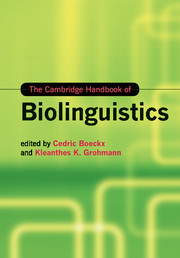Book contents
- The Cambridge Handbook of Biolinguistics
- The Cambridge Handbook of Biolinguistics
- Copyright page
- Dedication
- Contents
- Figures
- Tables
- Contributors
- Acknowledgements
- 1 Introducing the volume
- 2 Biolinguistics: A historical perspective
- 3 Biolinguistics yesterday, today, and tomorrow
- 4 The philosophical foundations of biolinguistics
- Part I Language development
- Part II Mind, brain, behavior
- 11 The role of experimental syntax in an integrated cognitive science of language
- 12 Working memory and language processing: Theory, data, and directions for future research
- 13 Computational primitives in phonology and their neural correlates
- 14 Computational primitives in syntax and possible brain correlates
- 15 Computational primitives in morphology and possible brain correlates
- 16 Grounding the cognitive neuroscience of semantics in linguistic theory
- 17 Modularity and descent-with-modification
- 18 The role of Broca’s area in language function
- 19 Lexical retrieval and its breakdown in aphasia and developmental language impairment
- 20 Genetics of language: Roots of specific language deficits
- Part III Language evolution
- Notes
- References
- Index
12 - Working memory and language processing: Theory, data, and directions for future research
from Part II - Mind, brain, behavior
Published online by Cambridge University Press: 05 May 2013
- The Cambridge Handbook of Biolinguistics
- The Cambridge Handbook of Biolinguistics
- Copyright page
- Dedication
- Contents
- Figures
- Tables
- Contributors
- Acknowledgements
- 1 Introducing the volume
- 2 Biolinguistics: A historical perspective
- 3 Biolinguistics yesterday, today, and tomorrow
- 4 The philosophical foundations of biolinguistics
- Part I Language development
- Part II Mind, brain, behavior
- 11 The role of experimental syntax in an integrated cognitive science of language
- 12 Working memory and language processing: Theory, data, and directions for future research
- 13 Computational primitives in phonology and their neural correlates
- 14 Computational primitives in syntax and possible brain correlates
- 15 Computational primitives in morphology and possible brain correlates
- 16 Grounding the cognitive neuroscience of semantics in linguistic theory
- 17 Modularity and descent-with-modification
- 18 The role of Broca’s area in language function
- 19 Lexical retrieval and its breakdown in aphasia and developmental language impairment
- 20 Genetics of language: Roots of specific language deficits
- Part III Language evolution
- Notes
- References
- Index
Summary
Information
- Type
- Chapter
- Information
- The Cambridge Handbook of Biolinguistics , pp. 203 - 232Publisher: Cambridge University PressPrint publication year: 2013
Accessibility standard: Unknown
- 4
- Cited by
